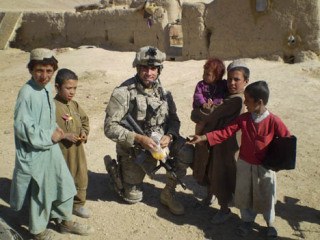Amid the chaos and cries, Stephen Blas did difficult duties – treating and evacuating wounded soldiers from the front-line battles in rugged Afghanistan.
It was an unforgettable experience, one the restless biology student at Pacific Lutheran University didn’t exactly expect when he left to enlist in the Navy more than 3½ years ago.
Blas wanted to see the world; what he saw was plenty of sorrow.
“I wanted the challenge to get out and go to a different place,” Blas recalled. “And now that I’ve been gone for so long, I’ve found I eventually wanted to come back home. Auburn will always be home.”
The young corpsman, born in Renton and raised in Auburn, is a changed man these days, someone with a different view of humanity tempered in a third world wracked by turmoil.
That perspective changed while Blas served his first tour of duty on battlegrounds half a world away.
Blas, a Petty Officer 2nd Class, was deployed to the Zabul province in southern Afghanistan as part of an embedded training team (ETT), working with the 2nd Battalion, 2nd Brigade, 205th Corps, Afghan National Army.
Proudly representing Navy medicine, Blas served as a mentor to Afghan medics and provided support to the ETT during 12 months of his 15-month deployment. An assignment like that meant hazardous days and nights, accompanying soldiers on foot and armored patrols.
Blas often found himself caught in the middle of a firefight or within the reach of deadly roadside bombs.
“It was challenging,” Blas said of the conflict. “You can’t tell the difference between the Taliban and a farmer unless they are shooting at you.”
Blas treated wounds and helped save lives of Afghan and U.S. soldiers. He witnessed the pain and suffering as he calmly responded to soldiers with traumatic brain injuries, severe burns, shrapnel and gunshot wounds, even lost limbs.
While he survived the backwash of dangerous missions, many of his colleagues did not.
“When you’re part of a team, you can’t help but get to know each other,” he said.
Blas performed above and beyond the call.
Two events bear this out.
In May, he was the first medic to arrive on the scene of a roadside bomb blast that killed an American soldier and interpreter. Blas pulled the driver from the burning Humvee, treated him for an hour on scene under enemy fire, then rode three hours with the wounded man in the back of a seven-ton truck to a field hospital.
The soldier survived.
In December, Blas treated an Army major injured by a grenade in a nighttime firefight.
“He was very confused, very delirious,” Blas recalled.
Blas stayed with the major through the night, about 15 hours, until he could be moved to a hospital. Blas was later credited with saving the man’s life.
BLAS EARNS HIGH HONOR
For his acts of bravery, Blas was awarded the distinguished Bronze Star last week at Camp Lejeune Naval Hospital in North Carolina.
“When placed in extraordinary circumstances … ordinary people rise to the occasion, and so, a hero is born,” said Capt. Gerard Cox, the hospital’s commanding officer, at the ceremony last Wednesday.
For Blas, accepting the medal was tough.
“It’s definitely out of my realm,” a humble Blas said. “In my mind, I simply did my job, like any Navy Corpsman. It’s definitely an honor. It’s rare. Not many corpsmen get the award, so it’s kind of unreal. It’s not something I expected.”
Blas worked closely with another corpsman, who also received a Bronze Star.
Of the five corpsmen serving in the province, four were injured in roadside bomb blasts. Blas was lucky to return statewide in September without a scratch.
Blas, a 2003 Auburn High School graduate, has since returned home to visit family. His parents, Joseph and Sonia, remain in Auburn. His sister, Michelle, lives in Seattle.
Blas, 24, is assigned to the sports medicine clinic at Camp Lejeune. He hasn’t decided whether to re-enlist in the Navy. But whatever his future holds, he will stay in medicine, perhaps as a physical therapist.
The wartime experience only supports his continued drive to help his fellow man.
“I felt like I made a difference, and that was a big difference,” he said.
The difference came from a war-torn experience. It brought out the best in a corpsman’s skills.
It also forged a different perspective.
“I definitely appreciate what we have here,” Blas said. “I appreciate the comforts of home … to be able to go to the store and get whatever food I like.
“I definitely understand what’s going on over there,” he added. “I understand what’s going on in the country, the difficulties, and why we can’t win the war right away.
“It’s slow, but there’s progress being made over there.”
Progress sometimes is hard to measure in a young man’s life, but Blas is certain of one thing: “I don’t know if I’m a better person, but I’m different. I see the world differently now,” he said.



